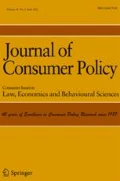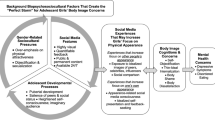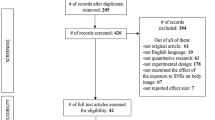Abstract
This paper reports outcomes from a research study whereby fashion-oriented students experienced life where the ability to acquire new clothing was removed. Students volunteered to participate in this experiential learning challenge, titled the Fashion Detox: to abstain from clothing acquisition for 10 weeks and reflect about the experience. This learning experience was characterized by barriers to sustainable consumption, chief among them a range of temptations prompted by inescapable merchandising and marketing strategies, compulsive tendencies, and envy of those who could consume with impunity. Students also indicated many benefits to abstaining from acquisition, such as creativity and self-regulation. This teaching and learning experiment has important implications for the challenges faced by educators who must engage fashion-oriented students in sustainability topics and how these may be navigated.
Similar content being viewed by others
References
ACPA – College Student Educators International (2008). Toward a sustainable future. American College Personnel Association. Accessed from http://louisville.edu/student/about/ACPASustainabilityMonograph.pdf.
Alexander, S. (2012). Planned economic contraction: the emerging case for degrowth. Environmental Politic, 21(3), 349–368. doi:10.1080/09644016.2012.671569.
Armstrong, C.M., & LeHew, M.L.A. (2011). Sustainable apparel product development: in search of a new dominant social paradigm for the field using sustainable approaches. Fashion Practice, 3(1), 29–62.
Bamberg, S. (2003). How does environmental concern influence specific environmentally related behaviors? A new answer to an old question. Journal of Environmental Psychology, 23, 21–32.
Bhardwaj, V., & Fairhurst, A. (2010). Fast fashion: response to changes in the fashion industry. The International Review of Retail, Distribution and Consumer Research, 20, 165–173.
Billeson, K., & Klasander, K. (2015). Dress code: sustainable fashion, bridging the attitude-behavior gap. Accessed 12 August 2015 from http://www.diva-portal.org/smash/get/diva2:822779/FULLTEXT01.pdf.
Birtwistle, G. & Moore, C.M. (2007). Fashion clothing – where does it all end up? International Journal of Retail & Distribution Management, 35(3), 210–216.
Bourdieu, P. (1979). Distinction: A social critique of the judgement of taste. London: Routledge.
Briceno, T., & Stagl, S. (2006). The role of social processes for sustainable consumption. Journal of Cleaner Production, 14, 1541–1551.
Butler, S. M., & Francis, S. (1997). The effects of environmental attitudes on apparel purchasing behavior. Clothing and Textiles Research Journal, 15, 76–85.
Cotton Incorporated (2013). Driving demand for denim jeans. Accessed 13 June 2014 from http://www.cottoninc.com/corporate/Market-Data/SupplyChainInsights/Driving-Demand-For-Denim-Jeans/.
Council for Textile Recycling (2014). About CTR. Accessed 05 March 2015 from http://weardonaterecycle.org/about/index.html.
Creswell, J.W. (2007). Qualitative inquiry and research design: choosing among five approaches. Thousand Oaks: Sage Publications, Inc.
Creswell, J.W. (2013). Qualitative inquiry and research design; choosing among five traditions. Thousand Oaks: Sage.
DeYoung, R. (1996). Some psychological aspects of reduced consumption behavior. Environment and Behavior, 28, 358–409.
Dickson, M.A., & Eckman, M. (2006). Social responsibility: the concept as defined by apparel and textile scholars. Clothing and Textile Research Journal, 24(3), 178–191.
Dickson, M.A., Loker, S., & Eckman, M. (2009). Social responsibility in the global apparel business. New York: Fairchild.
Diener, E., Helliwell, J., & Kahneman, D. (2010). International differences in well-being. Oxford: Oxford University Press.
Eicher, J. B., Evenson, S. L., & Lutz, H. A. (2008). The visual self: global perspectives on dress, culture and society. New York: Fairchild Books.
EPA (2010). Municipal solid waste in the United States: facts and figures. Office of Solid Waste: United States Environmental Protection Agency.
Featherstone, M. (1991). Consumer culture and postmodernism. London: Sage.
Firat, A., Kutucuoglu, K.Y., Arikan Saltik, I., & Tuncel, O. (2013). Consumption, consumer culture, and consumer society. Journal of Community Positive Practices, 13, 182–203.
Fletcher, K. (2008). Sustainable fashion and textiles: design journeys. London: Earthscan.
Fletcher, K. (2012). Durability, fashion, sustainability: the processes and practices of use. Fashion Practice, 4, 221–238.
Fletcher, K., & Grose, L. (2012). Fashion and sustainability: design for change. London: Laurence King Publishing, Ltd.
Gardetti, M.A., & Torres, A.L. (2013). Sustainability in fashion and textiles: values, design, production and consumption (Ebook). Accessed 14 August 2015 from www.greenleaf-publishing.com/content/pdfs/fashion_intro.pdf.
Giddings, B., Hopwood, B., & O’Brien, G. (2002). Environment, economy and society: fitting them together into sustainable development. Sustainable Development, 10(4), 187–196.
Goldsmith, R.E., Freiden, J.B., & Kilsheimer, J.C. (1993). Social values and female fashion leadership: a cross-cultural study. Psychology and Marketing, 10, 399–412.
Goworek, H., Fisher, T., Cooper, T., Woodward, S., & Hiller, A. (2012). The sustainable clothing market: an evaluation of potential strategies for UK retailers. International Journal of Retail Distribution Management, 40, 935–955.
Grauerholz, L., & Bubriski-McKenzie, A. (2012). Teaching about consumption: the “not buying it” project. Teaching Sociology, 40(4), 332–348.
Haigh, M. (2008). Internationalization, planetary citizenship and Higher Education, Inc. Compare: A Journal of Comparative and International Education, 38(4), 427–440.
Hellstrand, S., Skanberg, K., & Drake, L. (2009). The relevance of ecological and economic policies for sustainable development. Environment, Development and Sustainability, 11, 853–870. doi:10.1007/s10668-008-9156-1.
Herrmann, M. (2014). The challenge of sustainable development and the imperative green and inclusive economic growth. Modern Economy, 5, 154–160.
Hill, J., & Lee, H. (2012). Young Generation Y consumers’ perceptions of sustainability in the apparel industry. Journal of Fashion Marketing and Management, 16(4), 477–491.
Hiller Connell, K.Y. (2010). Internal and external barriers to eco-conscious apparel acquisition. International Journal of Consumer Studies, 34, 279–286.
Hiller Connell, K.Y., & Kozar, J.M. (2010). Encouraging sustainable apparel consumption among undergraduate students [Abstract]. Proceedings of the Association for the Advancement of Sustainability in Higher Education. Online publication: www.aashe.org.
Hiller Connell, K.Y., & Kozar, J.M. (2012a). Social normative influence: an exploratory study investigating its effectiveness in increasing engagement in sustainable apparel-purchasing behaviors. Journal of Global Fashion Marketing, 3, 172–179.
Hiller Connell, K.Y., & Kozar, J.M. (2012b). Sustainability knowledge and behaviors of apparel and textile undergraduates. International Journal of Sustainability in Higher Education, 3, 394–407.
Hines, J.D., & Swinker, M.E. (1996). Consumers’ willingness to purchase apparel produced from recycled fibers. Journal of Family and Consumer Sciences, 88, 41–44.
Hinterberger, F., Luks, F., and Stewen, M. (2008). Economic growth and sustainable development. UNESCO-EOLSS. Accessed 19 February 2016 from http://www.eolss.net/sample-chapters/c15/e1-29-04-08.pdf.
Holt, D.B. (1995). How consumers consume: a typology of consumption practices. The Journal of Consumer Research, 22, 1–16.
Hustvedt, G., & Bernard, J.C. (2010). Effects of social responsibility labelling and brand on willingness to pay for apparel. International Journal of Consumer Studies, 34, 619–626.
International Energy Agency (2015). Energy and climate change. World Energy Outlook Special Report: International Energy Agency.
Joy, A., Sherry, J.F., Venkatesh, A., Jr., Wang, J., & Chan, R. (2012). Fast fashion, sustainability, and the ethical appeal of luxury brands. Fashion Theory, 16, 273–296.
Kang, J., & Kim, S. (2013). What are consumers afraid of? Understanding perceived risk toward the consumption of environmentally sustainable apparel. Family and Consumer Sciences Research Journal, 41, 267–283.
Kim, H.S., & Damhorst, M.L. (1998). Environmental concern and apparel consumption. Clothing and Textiles Research Journal, 16, 126–133.
Kimchi, J., Polivka, B., & Stevenson, J. S. (1991). Triangulation: Operational definitions. Nursing Research, 40, 364–366.
Kirchgeorg, M., & Winn, M.I. (2006). Sustainability marketing for the poorest of the poor. Business Strategy and the Environment, 15, 171–184.
Kolb, D. (1984). Experiential learning as the science of learning and development. Englewood Cliffs: Prentice Hall.
Koszewska, M. (2013). A typology of Polish consumers and their behaviours in the market for sustainable textiles and clothing. International Journal of Consumer Studies, 37(5), 507–521.
Kozar, J.M., & Hiller Connell, K.Y. (2010). Socially responsible knowledge and behaviors. Comparing upper- vs. lower-classmen. College Student Journal, 44, 279–293.
Kozar, J.M., & Hiller Connell, K.Y. (2013). Socially and environmentally responsible apparel consumption: Knowledge, attitudes and behavior. Social Responsibility Journal, 9, 316–325.
Lancaster, A. (2011). Don’t buy this jacket: How well do you practice what you preach? Forbes.com. Accessed 18 June 2014 from http://www.forbes.com/sites/thebigenoughcompany/2011/12/01/dont-buy-this-jacket-how-well-do-you-practice-what-you-preach/.
Lane, R. (2000). The loss of happiness in market democracies. New Haven: Yale University Press.
Law, K.M., Zhang, Z., & Leung, C. (2004). Fashion change and fashion consumption: The chaotic perspective. Journal of Fashion Marketing and Management, 8, 362–374.
Layard, R., Mayraz, G., & Nickell, S. (2008). The marginal utility of income. Journal of Public Economics, 92(8–9), 1846–1857.
Lorek, S., & Fuchs, D. (2013). Strong sustainable consumption governance: Precondition for a degrowth plan? Journal of Cleaner Production, 38, 36–43.
Mainieri, T., Barnett, E.G., Valdero, T.R., Unipan, J.B., & Oskamp, S. (1997). Green buying: The influence of environmental concern on consumer behavior. The Journal of Social Psychology, 137, 189–204.
Max-Neef, M. (1995). Economic growth and quality of life: a threshold hypothesis. Ecological Economics, 15, 115–118.
McCracken, G. (1986). Culture and consumption: A theoretical account of the structure and movement of the cultural meaning of consumer goods. Journal of Consumer Research, 13, 71–84.
McKeown, R. (2006). Education for sustainable development toolkit. Paris, France: United Nations Educational, Scientific, and Cultural Organization. Accessed from www.unesco.org/education/desd.
McNeil, L., & Moore, R. (2015). Sustainable fashion consumption and the fast fashion conundrum: Fashionable consumers and attitudes to sustainability in clothing choice. International Journal of Consumer Studies, 39(3), 212–222.
Merriam, S.B. (1998). Qualitative research and case study applications in education. Hoboken: John Wiley and Sons.
Noble, S.M., Haytko, D.L., & Phillips, J. (2009). What drives college-age Generation Y consumers? Journal of Business Research, 62(6), 617–628.
Nordlund, A.M., & Garvill, J. (2002). Value structures behind pro-environmental behavior. Environment and Behavior, 34, 740–756.
Orr, D.W. (2004). Earth in mind. Washington, DC: Island Press.
Oskamp, S., Harrington, M.J., Edwards, T.C., Sherwood, D.L., Okuda, S.M., & Swanson, D.C. (1991). Factors influencing household recycling behaviors. Environment and Behavior, 23, 494–519.
Patagonia.com. (n.d.). Accessed 18 June 2014 from http://www.patagonia.com/us/patagonia.go?assetid=2388.
Price, L.L., & Ridgeway, N.M. (1983). Development of a scale to measure use innovativeness. In R.P. Bagozzi & A.M. Tybout (Eds.), Advances in consumer research (pp. 679–684). Dultuh: Association for Consumer Research.
Reiter, L. (2015). Investigating the role of social networking sites in increasing purchase intention for environmentally sustainable apparel: An exploratory study (Doctoral dissertation). Accessed 15 July 2015 from http://krex.k-state.edu/dspace/handle/2097/19004.
Richins, M.L., & Dawson, S. (1992). Materialism as a consumer value: Measure development and validation. Journal of Consumer Research, 19, 303–316.
Schiffman, L.G., & Kanuk, L.L. (2009). Consumer behavior. Upper Saddle River: Prentice Hall.
Schneider, F., Kallis, G., & Martinez-Alier, J. (2010). Crisis or opportunity? Economic degrowth for social equity and ecological sustainability. Journal of Cleaner Production, 18(6), 511–518.
Scott, D., & Willits, F.K. (1994). Environmental attitudes and behaviors: a Pennsylvania survey. Environment and Behavior, 26, 239–260.
Shaw, D., Hogg, G., Wilson, E., Shui, E., & Hassan, L. (2006). Fashion victim: the impact of fair trade concerns on clothing choice. Journal of Strategic Marketing, 14, 427–440.
Simlai, N. 2013. Water stewardship for industries: The need for a paradigm shift in India. WWF-India.
Simon, B. (2013). The super model of retail sustainability. Corporate Knights. Accessed 18 June 2014 from http://www.corporateknights.com/article/supermodel-retail-sustainability.
Sirgy, M. J., & Lee, D.-J. (2008). Well-being marketing: An ethical business philosophy for consumer good firms. Journal of Consumer Business Ethics, 77, 377–403.
Sisco, C., & Morris, J. (2015). The NICE consumer: Toward a framework for sustainable fashion consumption in the EU. The Danish Fashion Institute. Accessed 12 August 2015 from www.bsr.org/en/our-insights/report-view/nice-consumer-research-summary.
Stake, R.E. (1995). The art of case study research. Thousand Oakes: Sage Publications.
Svanström, M., Lozano-Garcia, F.J., & Rowe, D. (2008). Learning outcomes for sustainable development in higher education. International Journal of Sustainability in Higher Education, 9(3), 339–351.
UNESCO (2003). The United Nations decade for education for sustainable development. United Nations Educational, Scientific, and Cultural Organization. Retrieved from http://portal.unesco.org/education/en/ev.php-URL_ID=26295&URL_DO=DO_TOPIC&URL_SECTION=201.html.
Veblen, T. (1899). The theory of the leisure class: An economic study of institutions. New York: Macmillan.
Wilk, R. (2002). Consumption, human needs, and global environmental change. Global Environmental Change, 12, 5–13.
Wu, D., Thomas, J.B., Moore, M., & Caroll, K. (2012). Voluntary simplicity: The great American apparel diet. Journal of Fashion Marketing and Management, 17(3), 294–305.
YWCA. (2008). Beauty at any cost. Accessed 15 August 2015 from http://www.ywca.org/atf/cf/%7B711d5519-9e3c-4362-b753-ad138b5d352c%7D/BEAUTY-AT-ANY-COST.PDF.
Zaffalon, V. (2010). Climate change, carbon mitigation and textiles. Accessed 05 March 2015 from http://www.textileworld.com/Issues/2010/July-August/Dyeing_Printing_and_Finishing/Climate_Change-Carbon_Mitigation_And_Textiles.
Zukin, S., & Maguire, J.S. (2004). Consumers and consumption. Annual Review of Sociology, 30, 173–197.
Author information
Authors and Affiliations
Corresponding author
Rights and permissions
About this article
Cite this article
Joyner Armstrong, C.M., Connell, K.Y.H., Lang, C. et al. Educating for Sustainable Fashion: Using Clothing Acquisition Abstinence to Explore Sustainable Consumption and Life Beyond Growth. J Consum Policy 39, 417–439 (2016). https://doi.org/10.1007/s10603-016-9330-z
Received:
Accepted:
Published:
Issue Date:
DOI: https://doi.org/10.1007/s10603-016-9330-z




